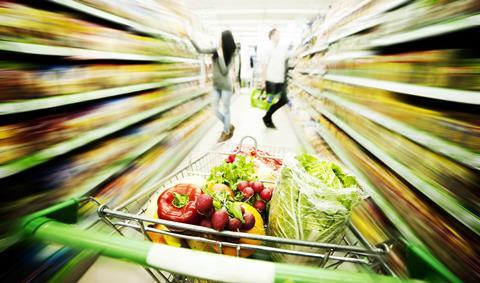Football tournament and falling inflation shape July shopping habits, Kantar figures reveal

England’s footballing hopes might have been dashed on Sunday, but there was still some cause for celebration in the British grocery industry this week.
Take-home sales at UK grocery retail increased by 2.2 per cent over the four weeks to 7 July 2024 compared to the prior year largely thanks to England’s participation in the men’s UEFA European Football Championship, Kantar data revealed.
The latest figures show the impact the Euros had on the sector, Fraser McKevitt, head of retail and consumer insight at Kantar, said in a statement.
Football fans drove beer sales up by an average of 13 per cent on the days that the England men’s team played, compared with the same day during the previous week. Sales of crisps and snacks also got a boost, up by 5 per cent compared with the month before.
Meanwhile, the dismal summer weather so far has also shaped supermarket sales, with shoppers continuing to reach for items more typically associated with cooler temperatures, such as flue and cold treatments, he said.
Inflation falls
Grocery price inflation fell again this month to 1.6 per cent – its lowest figure since September 2021. The drop coincided with the fastest rise in monthly footfall so far in 2024, according to Kantar. Britons made 2 per cent more trips to the supermarket this period than they did one year ago.
As pressure on pockets eased, sales of branded products increased by 3.6 per cent, outpacing own-label items at 2.7 per cent.
Amid signs that consumer confidence is improving, retailers will be turning their attention to the King’s Speech today (17 July) to see what the newly elected government’s legislative agenda holds for the grocery sector, McKevitt added.
“The retail landscape looks very different from 2010 when the last Labour government was in power – and so do our shopping trolleys. As diets have evolved, sales of popcorn, peanut butter and chilled vegetarian products, such as sausages and grills, have more than trebled. We’re also more likely to have premium ground and bean coffee in our cups now.”
Retail landscape
Ocado was the fastest growing grocer for the fifth month in a row, with sales up by 10.7 per cent over the 12 weeks to 7 July. The online-only retailer now holds 1.8 per cent of the market, up 0.1 percentage points compared with the same period last year.
Lidl saw a 7.8 per cent jump in sales, bringing its share of the market to 8.1 per cent.
Waitrose gained share for the first time since January 2022, achieving a 0.1 percentage point rise to 4.5 per cent as spending at the retailer increased by 3.3 per cent.
Britain’s largest grocer Tesco achieved its biggest share gain since November 2021, taking 27.7 per cent of the market – a 0.7 percentage point increase versus last year.
Sainsbury’s boosted sales by 4.7 per cent over the latest 12 weeks, bringing its share to 15.3 per cent up from 14.9 per cent.
Morrisons accounts for 8.7 per cent of the market, while Asda holds a 12.7 per cent share. Aldi’s market share now stands at 10 per cent. Co-op has a 5.7 per cent share, and Iceland maintains its 2.3 per cent portion of the market, nudging up its sales by 4.1 per cent.



